Comparative Essay: Japanese and Brazilian Business Cultures Analysis
VerifiedAdded on 2020/11/23
|10
|3556
|467
Essay
AI Summary
This essay undertakes a comparative analysis of the business cultures of Japan and Brazil, highlighting their distinct characteristics and impacts on organizational strategies. The introduction defines culture's influence on business behavior and ethics. The main body delves into a detailed comparison of Japanese and Brazilian business structures, including organizational hierarchies, time management approaches, and meeting styles. It utilizes Hofstede's cultural dimensions to analyze power distance, individualism, masculinity, uncertainty avoidance, long-term orientation, and indulgence in both countries. The essay further examines the application of these cultural differences through case studies of McDonald's and Petrobras, illustrating how these companies adapt to local cultural nuances in their operations and marketing strategies. The conclusion summarizes the key findings, emphasizing the importance of understanding cultural contexts in international business. References are provided for cited sources.
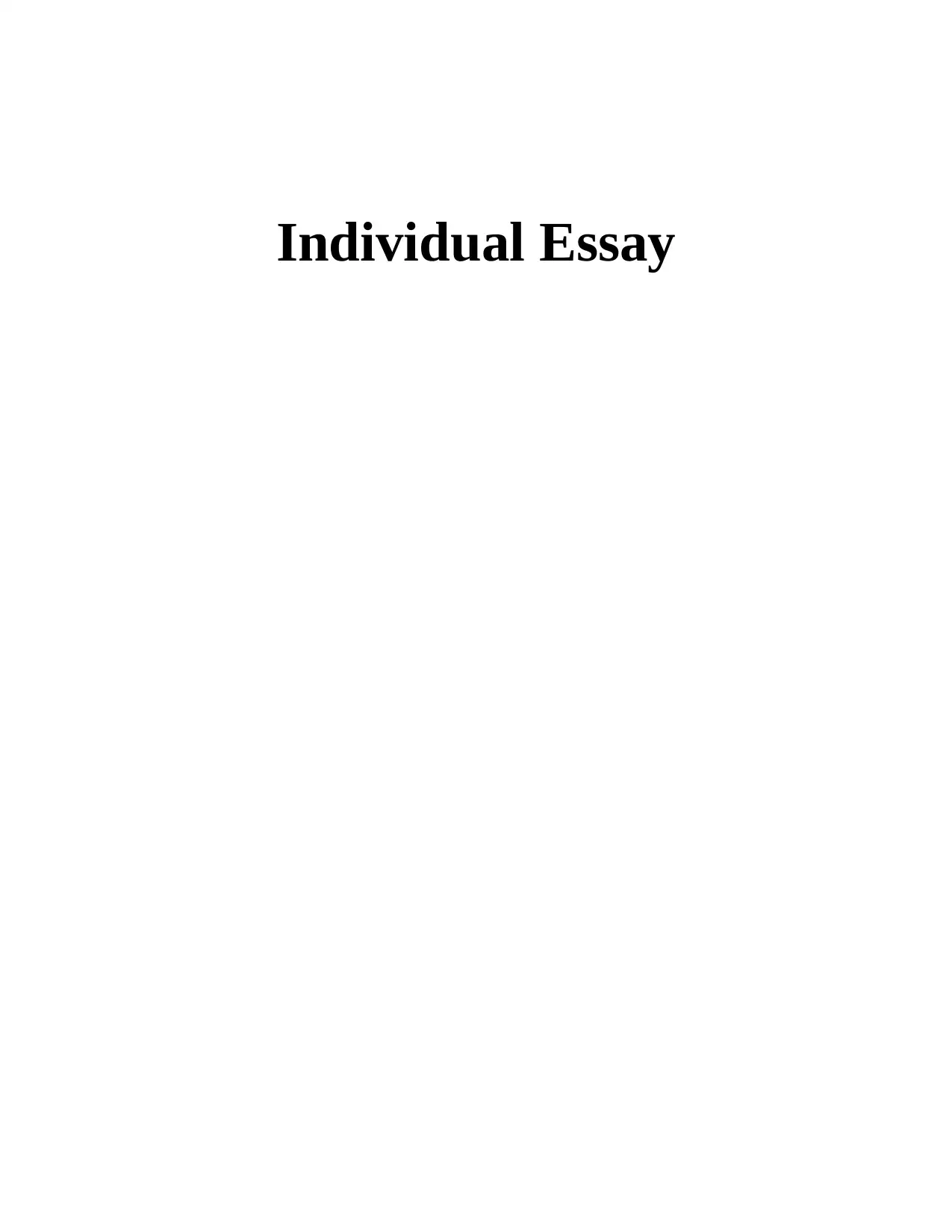
Individual Essay
Paraphrase This Document
Need a fresh take? Get an instant paraphrase of this document with our AI Paraphraser
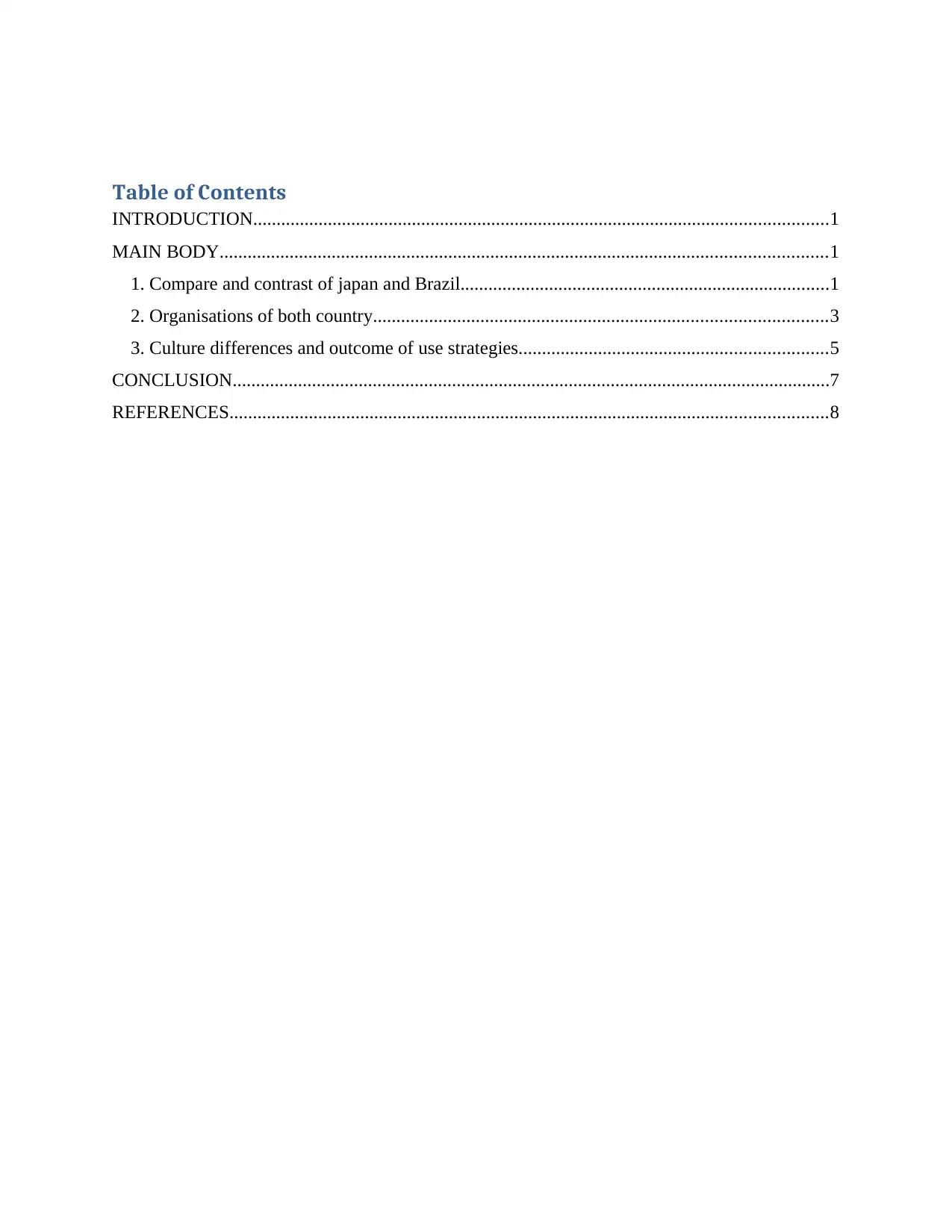
Table of Contents
INTRODUCTION...........................................................................................................................1
MAIN BODY..................................................................................................................................1
1. Compare and contrast of japan and Brazil...............................................................................1
2. Organisations of both country.................................................................................................3
3. Culture differences and outcome of use strategies..................................................................5
CONCLUSION................................................................................................................................7
REFERENCES................................................................................................................................8
INTRODUCTION...........................................................................................................................1
MAIN BODY..................................................................................................................................1
1. Compare and contrast of japan and Brazil...............................................................................1
2. Organisations of both country.................................................................................................3
3. Culture differences and outcome of use strategies..................................................................5
CONCLUSION................................................................................................................................7
REFERENCES................................................................................................................................8
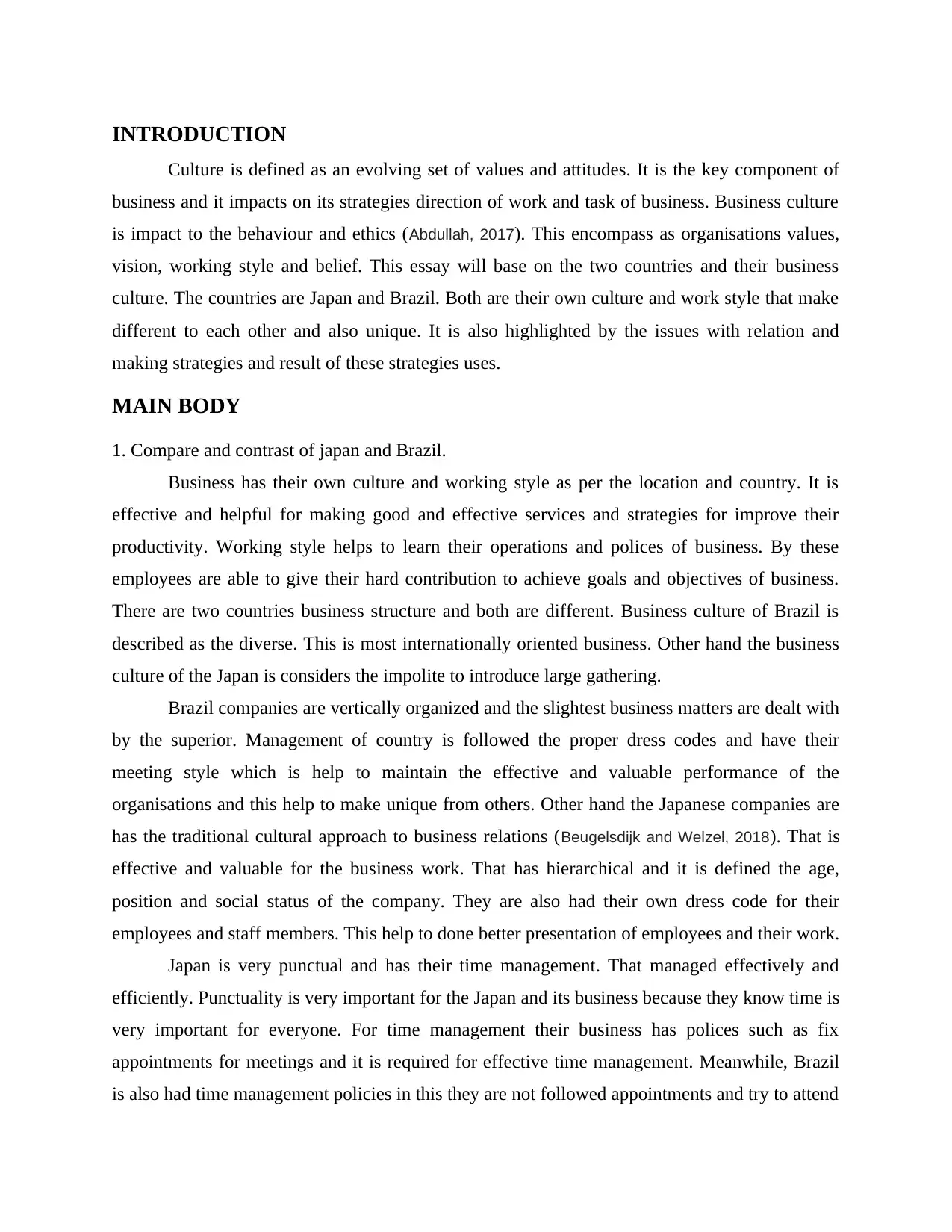
INTRODUCTION
Culture is defined as an evolving set of values and attitudes. It is the key component of
business and it impacts on its strategies direction of work and task of business. Business culture
is impact to the behaviour and ethics (Abdullah, 2017). This encompass as organisations values,
vision, working style and belief. This essay will base on the two countries and their business
culture. The countries are Japan and Brazil. Both are their own culture and work style that make
different to each other and also unique. It is also highlighted by the issues with relation and
making strategies and result of these strategies uses.
MAIN BODY
1. Compare and contrast of japan and Brazil.
Business has their own culture and working style as per the location and country. It is
effective and helpful for making good and effective services and strategies for improve their
productivity. Working style helps to learn their operations and polices of business. By these
employees are able to give their hard contribution to achieve goals and objectives of business.
There are two countries business structure and both are different. Business culture of Brazil is
described as the diverse. This is most internationally oriented business. Other hand the business
culture of the Japan is considers the impolite to introduce large gathering.
Brazil companies are vertically organized and the slightest business matters are dealt with
by the superior. Management of country is followed the proper dress codes and have their
meeting style which is help to maintain the effective and valuable performance of the
organisations and this help to make unique from others. Other hand the Japanese companies are
has the traditional cultural approach to business relations (Beugelsdijk and Welzel, 2018). That is
effective and valuable for the business work. That has hierarchical and it is defined the age,
position and social status of the company. They are also had their own dress code for their
employees and staff members. This help to done better presentation of employees and their work.
Japan is very punctual and has their time management. That managed effectively and
efficiently. Punctuality is very important for the Japan and its business because they know time is
very important for everyone. For time management their business has polices such as fix
appointments for meetings and it is required for effective time management. Meanwhile, Brazil
is also had time management policies in this they are not followed appointments and try to attend
Culture is defined as an evolving set of values and attitudes. It is the key component of
business and it impacts on its strategies direction of work and task of business. Business culture
is impact to the behaviour and ethics (Abdullah, 2017). This encompass as organisations values,
vision, working style and belief. This essay will base on the two countries and their business
culture. The countries are Japan and Brazil. Both are their own culture and work style that make
different to each other and also unique. It is also highlighted by the issues with relation and
making strategies and result of these strategies uses.
MAIN BODY
1. Compare and contrast of japan and Brazil.
Business has their own culture and working style as per the location and country. It is
effective and helpful for making good and effective services and strategies for improve their
productivity. Working style helps to learn their operations and polices of business. By these
employees are able to give their hard contribution to achieve goals and objectives of business.
There are two countries business structure and both are different. Business culture of Brazil is
described as the diverse. This is most internationally oriented business. Other hand the business
culture of the Japan is considers the impolite to introduce large gathering.
Brazil companies are vertically organized and the slightest business matters are dealt with
by the superior. Management of country is followed the proper dress codes and have their
meeting style which is help to maintain the effective and valuable performance of the
organisations and this help to make unique from others. Other hand the Japanese companies are
has the traditional cultural approach to business relations (Beugelsdijk and Welzel, 2018). That is
effective and valuable for the business work. That has hierarchical and it is defined the age,
position and social status of the company. They are also had their own dress code for their
employees and staff members. This help to done better presentation of employees and their work.
Japan is very punctual and has their time management. That managed effectively and
efficiently. Punctuality is very important for the Japan and its business because they know time is
very important for everyone. For time management their business has polices such as fix
appointments for meetings and it is required for effective time management. Meanwhile, Brazil
is also had time management policies in this they are not followed appointments and try to attend
⊘ This is a preview!⊘
Do you want full access?
Subscribe today to unlock all pages.

Trusted by 1+ million students worldwide
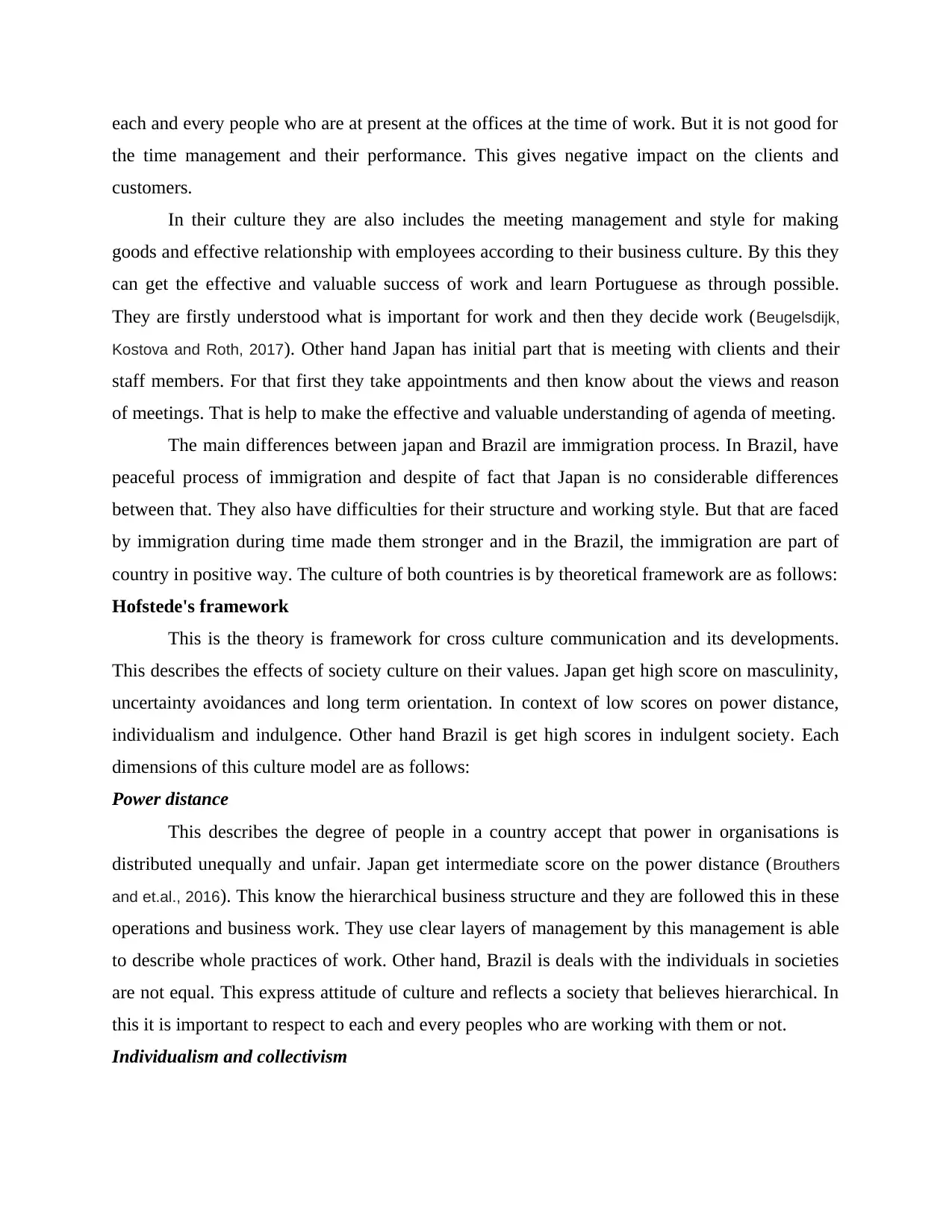
each and every people who are at present at the offices at the time of work. But it is not good for
the time management and their performance. This gives negative impact on the clients and
customers.
In their culture they are also includes the meeting management and style for making
goods and effective relationship with employees according to their business culture. By this they
can get the effective and valuable success of work and learn Portuguese as through possible.
They are firstly understood what is important for work and then they decide work (Beugelsdijk,
Kostova and Roth, 2017). Other hand Japan has initial part that is meeting with clients and their
staff members. For that first they take appointments and then know about the views and reason
of meetings. That is help to make the effective and valuable understanding of agenda of meeting.
The main differences between japan and Brazil are immigration process. In Brazil, have
peaceful process of immigration and despite of fact that Japan is no considerable differences
between that. They also have difficulties for their structure and working style. But that are faced
by immigration during time made them stronger and in the Brazil, the immigration are part of
country in positive way. The culture of both countries is by theoretical framework are as follows:
Hofstede's framework
This is the theory is framework for cross culture communication and its developments.
This describes the effects of society culture on their values. Japan get high score on masculinity,
uncertainty avoidances and long term orientation. In context of low scores on power distance,
individualism and indulgence. Other hand Brazil is get high scores in indulgent society. Each
dimensions of this culture model are as follows:
Power distance
This describes the degree of people in a country accept that power in organisations is
distributed unequally and unfair. Japan get intermediate score on the power distance (Brouthers
and et.al., 2016). This know the hierarchical business structure and they are followed this in these
operations and business work. They use clear layers of management by this management is able
to describe whole practices of work. Other hand, Brazil is deals with the individuals in societies
are not equal. This express attitude of culture and reflects a society that believes hierarchical. In
this it is important to respect to each and every peoples who are working with them or not.
Individualism and collectivism
the time management and their performance. This gives negative impact on the clients and
customers.
In their culture they are also includes the meeting management and style for making
goods and effective relationship with employees according to their business culture. By this they
can get the effective and valuable success of work and learn Portuguese as through possible.
They are firstly understood what is important for work and then they decide work (Beugelsdijk,
Kostova and Roth, 2017). Other hand Japan has initial part that is meeting with clients and their
staff members. For that first they take appointments and then know about the views and reason
of meetings. That is help to make the effective and valuable understanding of agenda of meeting.
The main differences between japan and Brazil are immigration process. In Brazil, have
peaceful process of immigration and despite of fact that Japan is no considerable differences
between that. They also have difficulties for their structure and working style. But that are faced
by immigration during time made them stronger and in the Brazil, the immigration are part of
country in positive way. The culture of both countries is by theoretical framework are as follows:
Hofstede's framework
This is the theory is framework for cross culture communication and its developments.
This describes the effects of society culture on their values. Japan get high score on masculinity,
uncertainty avoidances and long term orientation. In context of low scores on power distance,
individualism and indulgence. Other hand Brazil is get high scores in indulgent society. Each
dimensions of this culture model are as follows:
Power distance
This describes the degree of people in a country accept that power in organisations is
distributed unequally and unfair. Japan get intermediate score on the power distance (Brouthers
and et.al., 2016). This know the hierarchical business structure and they are followed this in these
operations and business work. They use clear layers of management by this management is able
to describe whole practices of work. Other hand, Brazil is deals with the individuals in societies
are not equal. This express attitude of culture and reflects a society that believes hierarchical. In
this it is important to respect to each and every peoples who are working with them or not.
Individualism and collectivism
Paraphrase This Document
Need a fresh take? Get an instant paraphrase of this document with our AI Paraphraser
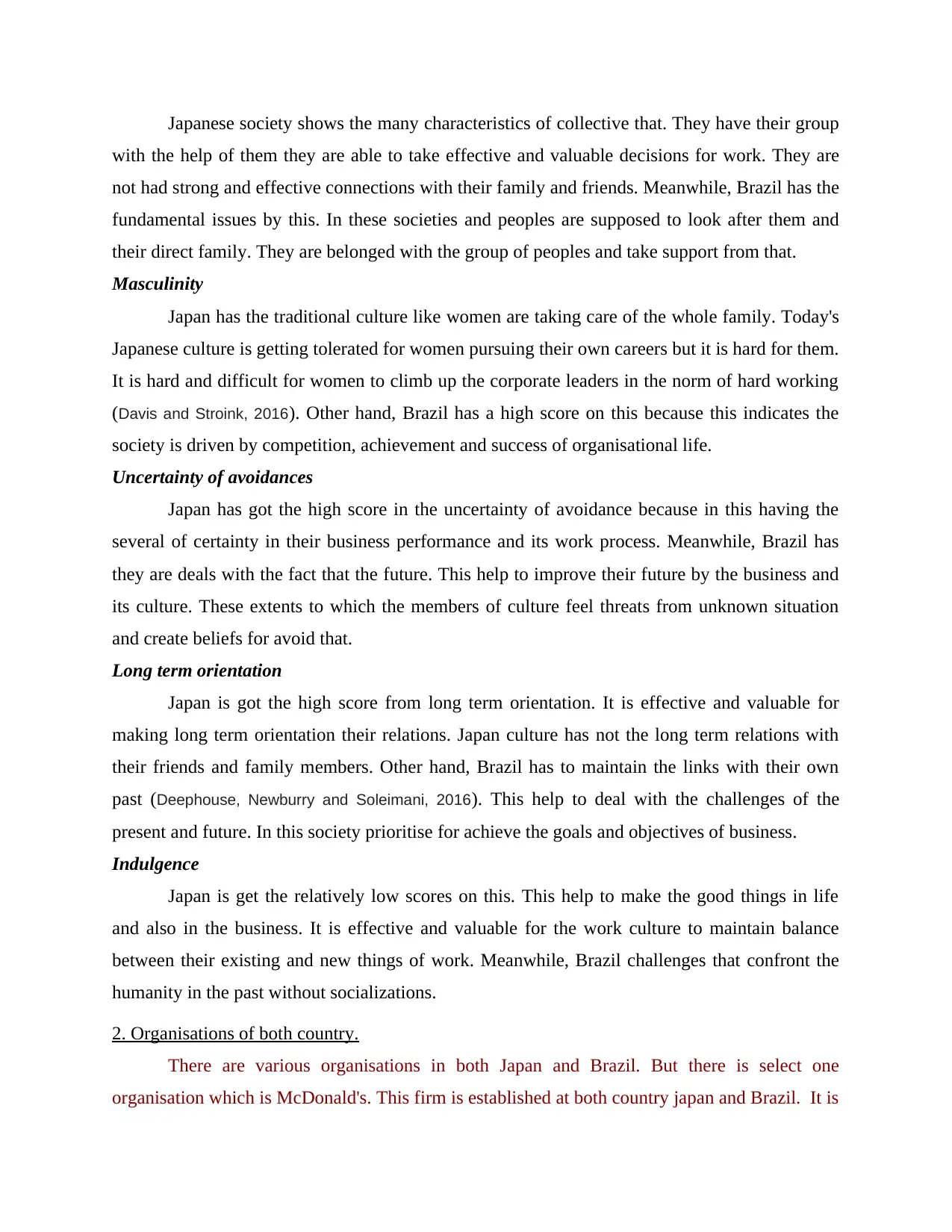
Japanese society shows the many characteristics of collective that. They have their group
with the help of them they are able to take effective and valuable decisions for work. They are
not had strong and effective connections with their family and friends. Meanwhile, Brazil has the
fundamental issues by this. In these societies and peoples are supposed to look after them and
their direct family. They are belonged with the group of peoples and take support from that.
Masculinity
Japan has the traditional culture like women are taking care of the whole family. Today's
Japanese culture is getting tolerated for women pursuing their own careers but it is hard for them.
It is hard and difficult for women to climb up the corporate leaders in the norm of hard working
(Davis and Stroink, 2016). Other hand, Brazil has a high score on this because this indicates the
society is driven by competition, achievement and success of organisational life.
Uncertainty of avoidances
Japan has got the high score in the uncertainty of avoidance because in this having the
several of certainty in their business performance and its work process. Meanwhile, Brazil has
they are deals with the fact that the future. This help to improve their future by the business and
its culture. These extents to which the members of culture feel threats from unknown situation
and create beliefs for avoid that.
Long term orientation
Japan is got the high score from long term orientation. It is effective and valuable for
making long term orientation their relations. Japan culture has not the long term relations with
their friends and family members. Other hand, Brazil has to maintain the links with their own
past (Deephouse, Newburry and Soleimani, 2016). This help to deal with the challenges of the
present and future. In this society prioritise for achieve the goals and objectives of business.
Indulgence
Japan is get the relatively low scores on this. This help to make the good things in life
and also in the business. It is effective and valuable for the work culture to maintain balance
between their existing and new things of work. Meanwhile, Brazil challenges that confront the
humanity in the past without socializations.
2. Organisations of both country.
There are various organisations in both Japan and Brazil. But there is select one
organisation which is McDonald's. This firm is established at both country japan and Brazil. It is
with the help of them they are able to take effective and valuable decisions for work. They are
not had strong and effective connections with their family and friends. Meanwhile, Brazil has the
fundamental issues by this. In these societies and peoples are supposed to look after them and
their direct family. They are belonged with the group of peoples and take support from that.
Masculinity
Japan has the traditional culture like women are taking care of the whole family. Today's
Japanese culture is getting tolerated for women pursuing their own careers but it is hard for them.
It is hard and difficult for women to climb up the corporate leaders in the norm of hard working
(Davis and Stroink, 2016). Other hand, Brazil has a high score on this because this indicates the
society is driven by competition, achievement and success of organisational life.
Uncertainty of avoidances
Japan has got the high score in the uncertainty of avoidance because in this having the
several of certainty in their business performance and its work process. Meanwhile, Brazil has
they are deals with the fact that the future. This help to improve their future by the business and
its culture. These extents to which the members of culture feel threats from unknown situation
and create beliefs for avoid that.
Long term orientation
Japan is got the high score from long term orientation. It is effective and valuable for
making long term orientation their relations. Japan culture has not the long term relations with
their friends and family members. Other hand, Brazil has to maintain the links with their own
past (Deephouse, Newburry and Soleimani, 2016). This help to deal with the challenges of the
present and future. In this society prioritise for achieve the goals and objectives of business.
Indulgence
Japan is get the relatively low scores on this. This help to make the good things in life
and also in the business. It is effective and valuable for the work culture to maintain balance
between their existing and new things of work. Meanwhile, Brazil challenges that confront the
humanity in the past without socializations.
2. Organisations of both country.
There are various organisations in both Japan and Brazil. But there is select one
organisation which is McDonald's. This firm is established at both country japan and Brazil. It is
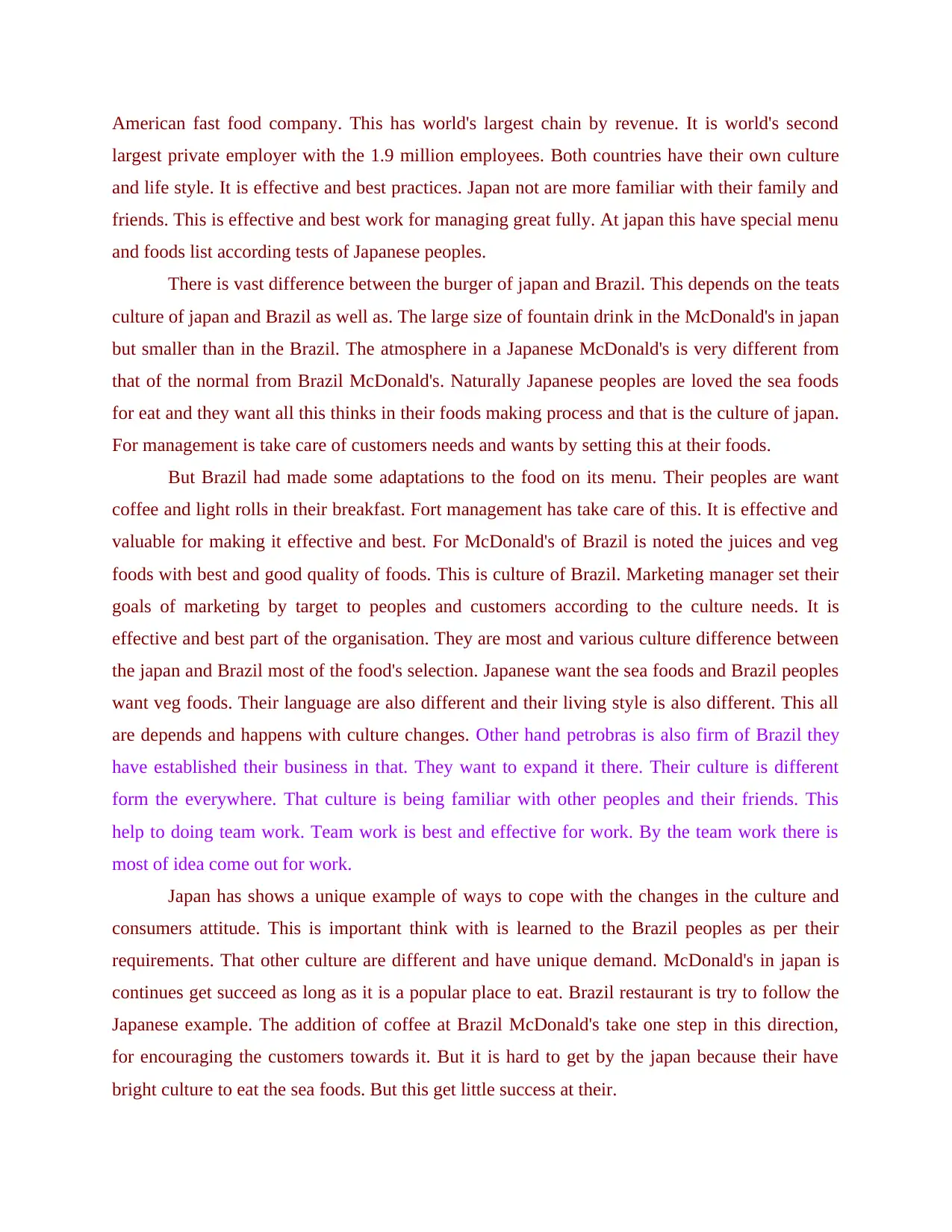
American fast food company. This has world's largest chain by revenue. It is world's second
largest private employer with the 1.9 million employees. Both countries have their own culture
and life style. It is effective and best practices. Japan not are more familiar with their family and
friends. This is effective and best work for managing great fully. At japan this have special menu
and foods list according tests of Japanese peoples.
There is vast difference between the burger of japan and Brazil. This depends on the teats
culture of japan and Brazil as well as. The large size of fountain drink in the McDonald's in japan
but smaller than in the Brazil. The atmosphere in a Japanese McDonald's is very different from
that of the normal from Brazil McDonald's. Naturally Japanese peoples are loved the sea foods
for eat and they want all this thinks in their foods making process and that is the culture of japan.
For management is take care of customers needs and wants by setting this at their foods.
But Brazil had made some adaptations to the food on its menu. Their peoples are want
coffee and light rolls in their breakfast. Fort management has take care of this. It is effective and
valuable for making it effective and best. For McDonald's of Brazil is noted the juices and veg
foods with best and good quality of foods. This is culture of Brazil. Marketing manager set their
goals of marketing by target to peoples and customers according to the culture needs. It is
effective and best part of the organisation. They are most and various culture difference between
the japan and Brazil most of the food's selection. Japanese want the sea foods and Brazil peoples
want veg foods. Their language are also different and their living style is also different. This all
are depends and happens with culture changes. Other hand petrobras is also firm of Brazil they
have established their business in that. They want to expand it there. Their culture is different
form the everywhere. That culture is being familiar with other peoples and their friends. This
help to doing team work. Team work is best and effective for work. By the team work there is
most of idea come out for work.
Japan has shows a unique example of ways to cope with the changes in the culture and
consumers attitude. This is important think with is learned to the Brazil peoples as per their
requirements. That other culture are different and have unique demand. McDonald's in japan is
continues get succeed as long as it is a popular place to eat. Brazil restaurant is try to follow the
Japanese example. The addition of coffee at Brazil McDonald's take one step in this direction,
for encouraging the customers towards it. But it is hard to get by the japan because their have
bright culture to eat the sea foods. But this get little success at their.
largest private employer with the 1.9 million employees. Both countries have their own culture
and life style. It is effective and best practices. Japan not are more familiar with their family and
friends. This is effective and best work for managing great fully. At japan this have special menu
and foods list according tests of Japanese peoples.
There is vast difference between the burger of japan and Brazil. This depends on the teats
culture of japan and Brazil as well as. The large size of fountain drink in the McDonald's in japan
but smaller than in the Brazil. The atmosphere in a Japanese McDonald's is very different from
that of the normal from Brazil McDonald's. Naturally Japanese peoples are loved the sea foods
for eat and they want all this thinks in their foods making process and that is the culture of japan.
For management is take care of customers needs and wants by setting this at their foods.
But Brazil had made some adaptations to the food on its menu. Their peoples are want
coffee and light rolls in their breakfast. Fort management has take care of this. It is effective and
valuable for making it effective and best. For McDonald's of Brazil is noted the juices and veg
foods with best and good quality of foods. This is culture of Brazil. Marketing manager set their
goals of marketing by target to peoples and customers according to the culture needs. It is
effective and best part of the organisation. They are most and various culture difference between
the japan and Brazil most of the food's selection. Japanese want the sea foods and Brazil peoples
want veg foods. Their language are also different and their living style is also different. This all
are depends and happens with culture changes. Other hand petrobras is also firm of Brazil they
have established their business in that. They want to expand it there. Their culture is different
form the everywhere. That culture is being familiar with other peoples and their friends. This
help to doing team work. Team work is best and effective for work. By the team work there is
most of idea come out for work.
Japan has shows a unique example of ways to cope with the changes in the culture and
consumers attitude. This is important think with is learned to the Brazil peoples as per their
requirements. That other culture are different and have unique demand. McDonald's in japan is
continues get succeed as long as it is a popular place to eat. Brazil restaurant is try to follow the
Japanese example. The addition of coffee at Brazil McDonald's take one step in this direction,
for encouraging the customers towards it. But it is hard to get by the japan because their have
bright culture to eat the sea foods. But this get little success at their.
⊘ This is a preview!⊘
Do you want full access?
Subscribe today to unlock all pages.

Trusted by 1+ million students worldwide
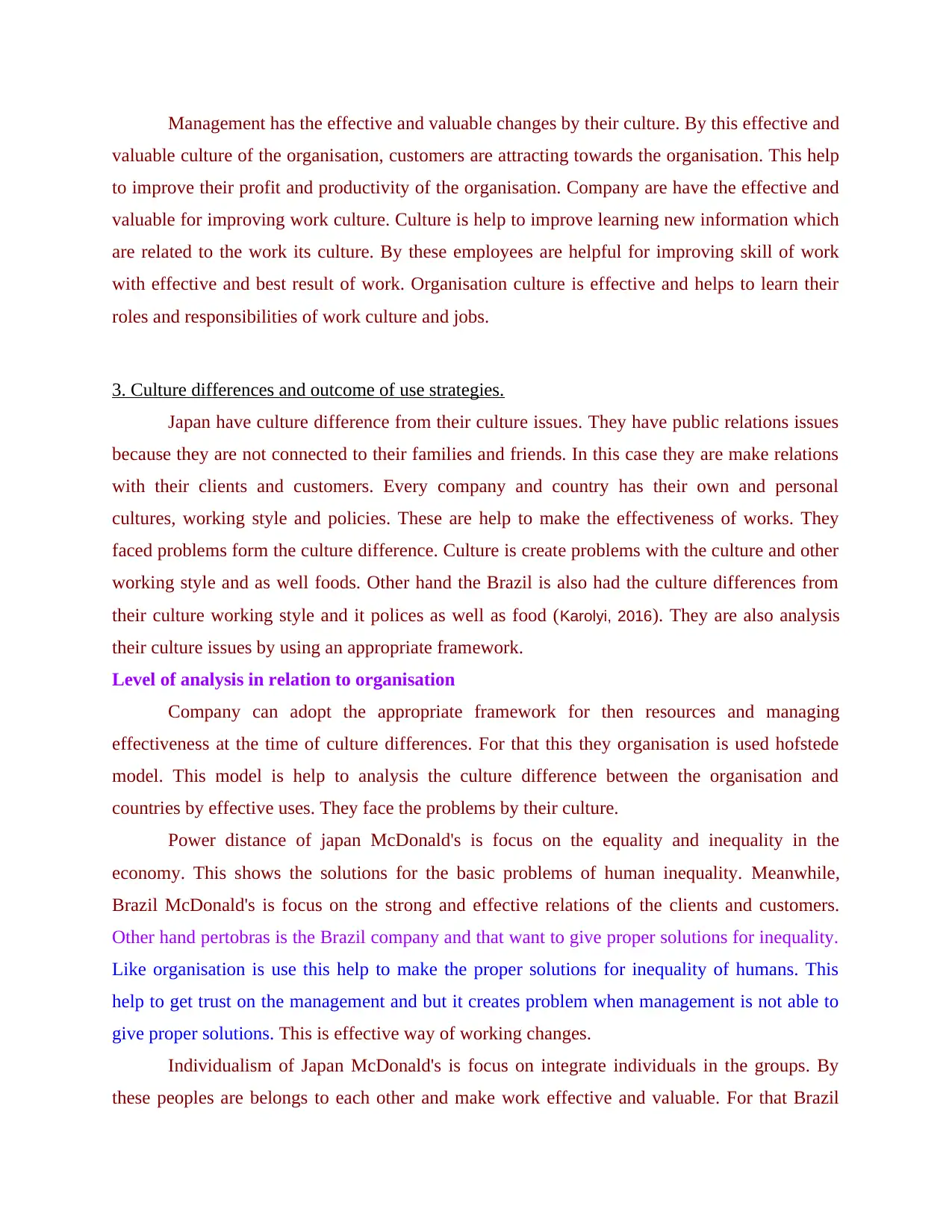
Management has the effective and valuable changes by their culture. By this effective and
valuable culture of the organisation, customers are attracting towards the organisation. This help
to improve their profit and productivity of the organisation. Company are have the effective and
valuable for improving work culture. Culture is help to improve learning new information which
are related to the work its culture. By these employees are helpful for improving skill of work
with effective and best result of work. Organisation culture is effective and helps to learn their
roles and responsibilities of work culture and jobs.
3. Culture differences and outcome of use strategies.
Japan have culture difference from their culture issues. They have public relations issues
because they are not connected to their families and friends. In this case they are make relations
with their clients and customers. Every company and country has their own and personal
cultures, working style and policies. These are help to make the effectiveness of works. They
faced problems form the culture difference. Culture is create problems with the culture and other
working style and as well foods. Other hand the Brazil is also had the culture differences from
their culture working style and it polices as well as food (Karolyi, 2016). They are also analysis
their culture issues by using an appropriate framework.
Level of analysis in relation to organisation
Company can adopt the appropriate framework for then resources and managing
effectiveness at the time of culture differences. For that this they organisation is used hofstede
model. This model is help to analysis the culture difference between the organisation and
countries by effective uses. They face the problems by their culture.
Power distance of japan McDonald's is focus on the equality and inequality in the
economy. This shows the solutions for the basic problems of human inequality. Meanwhile,
Brazil McDonald's is focus on the strong and effective relations of the clients and customers.
Other hand pertobras is the Brazil company and that want to give proper solutions for inequality.
Like organisation is use this help to make the proper solutions for inequality of humans. This
help to get trust on the management and but it creates problem when management is not able to
give proper solutions. This is effective way of working changes.
Individualism of Japan McDonald's is focus on integrate individuals in the groups. By
these peoples are belongs to each other and make work effective and valuable. For that Brazil
valuable culture of the organisation, customers are attracting towards the organisation. This help
to improve their profit and productivity of the organisation. Company are have the effective and
valuable for improving work culture. Culture is help to improve learning new information which
are related to the work its culture. By these employees are helpful for improving skill of work
with effective and best result of work. Organisation culture is effective and helps to learn their
roles and responsibilities of work culture and jobs.
3. Culture differences and outcome of use strategies.
Japan have culture difference from their culture issues. They have public relations issues
because they are not connected to their families and friends. In this case they are make relations
with their clients and customers. Every company and country has their own and personal
cultures, working style and policies. These are help to make the effectiveness of works. They
faced problems form the culture difference. Culture is create problems with the culture and other
working style and as well foods. Other hand the Brazil is also had the culture differences from
their culture working style and it polices as well as food (Karolyi, 2016). They are also analysis
their culture issues by using an appropriate framework.
Level of analysis in relation to organisation
Company can adopt the appropriate framework for then resources and managing
effectiveness at the time of culture differences. For that this they organisation is used hofstede
model. This model is help to analysis the culture difference between the organisation and
countries by effective uses. They face the problems by their culture.
Power distance of japan McDonald's is focus on the equality and inequality in the
economy. This shows the solutions for the basic problems of human inequality. Meanwhile,
Brazil McDonald's is focus on the strong and effective relations of the clients and customers.
Other hand pertobras is the Brazil company and that want to give proper solutions for inequality.
Like organisation is use this help to make the proper solutions for inequality of humans. This
help to get trust on the management and but it creates problem when management is not able to
give proper solutions. This is effective way of working changes.
Individualism of Japan McDonald's is focus on integrate individuals in the groups. By
these peoples are belongs to each other and make work effective and valuable. For that Brazil
Paraphrase This Document
Need a fresh take? Get an instant paraphrase of this document with our AI Paraphraser
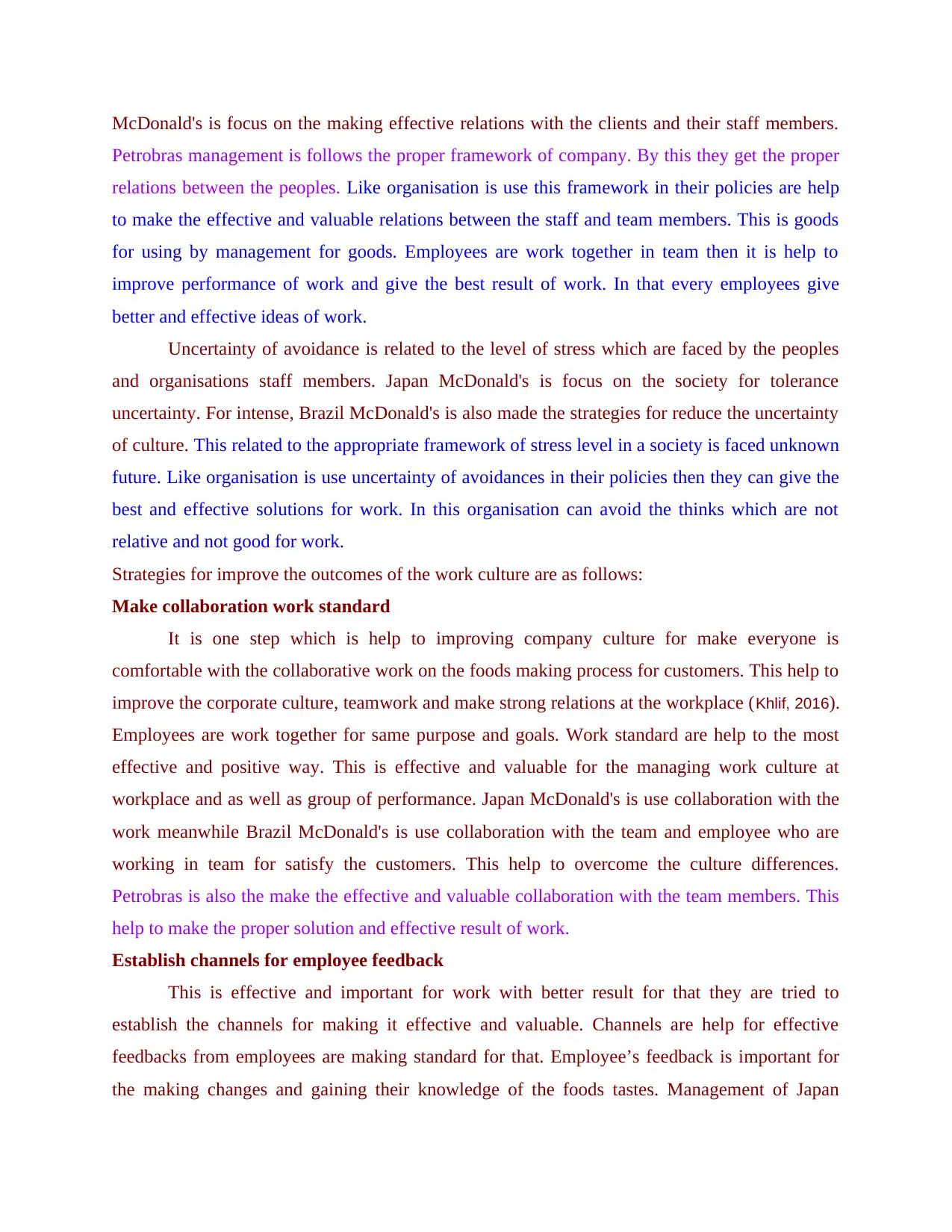
McDonald's is focus on the making effective relations with the clients and their staff members.
Petrobras management is follows the proper framework of company. By this they get the proper
relations between the peoples. Like organisation is use this framework in their policies are help
to make the effective and valuable relations between the staff and team members. This is goods
for using by management for goods. Employees are work together in team then it is help to
improve performance of work and give the best result of work. In that every employees give
better and effective ideas of work.
Uncertainty of avoidance is related to the level of stress which are faced by the peoples
and organisations staff members. Japan McDonald's is focus on the society for tolerance
uncertainty. For intense, Brazil McDonald's is also made the strategies for reduce the uncertainty
of culture. This related to the appropriate framework of stress level in a society is faced unknown
future. Like organisation is use uncertainty of avoidances in their policies then they can give the
best and effective solutions for work. In this organisation can avoid the thinks which are not
relative and not good for work.
Strategies for improve the outcomes of the work culture are as follows:
Make collaboration work standard
It is one step which is help to improving company culture for make everyone is
comfortable with the collaborative work on the foods making process for customers. This help to
improve the corporate culture, teamwork and make strong relations at the workplace (Khlif, 2016).
Employees are work together for same purpose and goals. Work standard are help to the most
effective and positive way. This is effective and valuable for the managing work culture at
workplace and as well as group of performance. Japan McDonald's is use collaboration with the
work meanwhile Brazil McDonald's is use collaboration with the team and employee who are
working in team for satisfy the customers. This help to overcome the culture differences.
Petrobras is also the make the effective and valuable collaboration with the team members. This
help to make the proper solution and effective result of work.
Establish channels for employee feedback
This is effective and important for work with better result for that they are tried to
establish the channels for making it effective and valuable. Channels are help for effective
feedbacks from employees are making standard for that. Employee’s feedback is important for
the making changes and gaining their knowledge of the foods tastes. Management of Japan
Petrobras management is follows the proper framework of company. By this they get the proper
relations between the peoples. Like organisation is use this framework in their policies are help
to make the effective and valuable relations between the staff and team members. This is goods
for using by management for goods. Employees are work together in team then it is help to
improve performance of work and give the best result of work. In that every employees give
better and effective ideas of work.
Uncertainty of avoidance is related to the level of stress which are faced by the peoples
and organisations staff members. Japan McDonald's is focus on the society for tolerance
uncertainty. For intense, Brazil McDonald's is also made the strategies for reduce the uncertainty
of culture. This related to the appropriate framework of stress level in a society is faced unknown
future. Like organisation is use uncertainty of avoidances in their policies then they can give the
best and effective solutions for work. In this organisation can avoid the thinks which are not
relative and not good for work.
Strategies for improve the outcomes of the work culture are as follows:
Make collaboration work standard
It is one step which is help to improving company culture for make everyone is
comfortable with the collaborative work on the foods making process for customers. This help to
improve the corporate culture, teamwork and make strong relations at the workplace (Khlif, 2016).
Employees are work together for same purpose and goals. Work standard are help to the most
effective and positive way. This is effective and valuable for the managing work culture at
workplace and as well as group of performance. Japan McDonald's is use collaboration with the
work meanwhile Brazil McDonald's is use collaboration with the team and employee who are
working in team for satisfy the customers. This help to overcome the culture differences.
Petrobras is also the make the effective and valuable collaboration with the team members. This
help to make the proper solution and effective result of work.
Establish channels for employee feedback
This is effective and important for work with better result for that they are tried to
establish the channels for making it effective and valuable. Channels are help for effective
feedbacks from employees are making standard for that. Employee’s feedback is important for
the making changes and gaining their knowledge of the foods tastes. Management of Japan
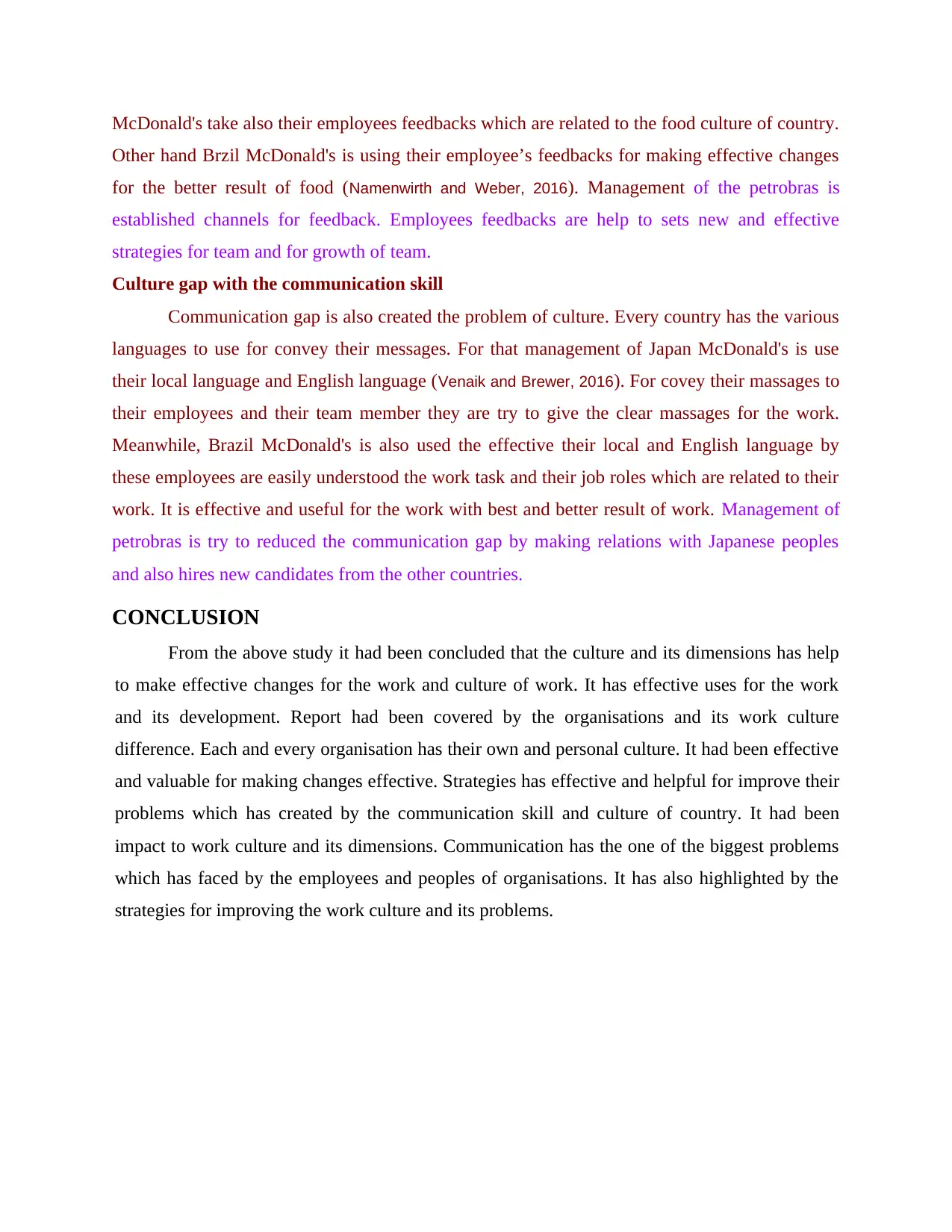
McDonald's take also their employees feedbacks which are related to the food culture of country.
Other hand Brzil McDonald's is using their employee’s feedbacks for making effective changes
for the better result of food (Namenwirth and Weber, 2016). Management of the petrobras is
established channels for feedback. Employees feedbacks are help to sets new and effective
strategies for team and for growth of team.
Culture gap with the communication skill
Communication gap is also created the problem of culture. Every country has the various
languages to use for convey their messages. For that management of Japan McDonald's is use
their local language and English language (Venaik and Brewer, 2016). For covey their massages to
their employees and their team member they are try to give the clear massages for the work.
Meanwhile, Brazil McDonald's is also used the effective their local and English language by
these employees are easily understood the work task and their job roles which are related to their
work. It is effective and useful for the work with best and better result of work. Management of
petrobras is try to reduced the communication gap by making relations with Japanese peoples
and also hires new candidates from the other countries.
CONCLUSION
From the above study it had been concluded that the culture and its dimensions has help
to make effective changes for the work and culture of work. It has effective uses for the work
and its development. Report had been covered by the organisations and its work culture
difference. Each and every organisation has their own and personal culture. It had been effective
and valuable for making changes effective. Strategies has effective and helpful for improve their
problems which has created by the communication skill and culture of country. It had been
impact to work culture and its dimensions. Communication has the one of the biggest problems
which has faced by the employees and peoples of organisations. It has also highlighted by the
strategies for improving the work culture and its problems.
Other hand Brzil McDonald's is using their employee’s feedbacks for making effective changes
for the better result of food (Namenwirth and Weber, 2016). Management of the petrobras is
established channels for feedback. Employees feedbacks are help to sets new and effective
strategies for team and for growth of team.
Culture gap with the communication skill
Communication gap is also created the problem of culture. Every country has the various
languages to use for convey their messages. For that management of Japan McDonald's is use
their local language and English language (Venaik and Brewer, 2016). For covey their massages to
their employees and their team member they are try to give the clear massages for the work.
Meanwhile, Brazil McDonald's is also used the effective their local and English language by
these employees are easily understood the work task and their job roles which are related to their
work. It is effective and useful for the work with best and better result of work. Management of
petrobras is try to reduced the communication gap by making relations with Japanese peoples
and also hires new candidates from the other countries.
CONCLUSION
From the above study it had been concluded that the culture and its dimensions has help
to make effective changes for the work and culture of work. It has effective uses for the work
and its development. Report had been covered by the organisations and its work culture
difference. Each and every organisation has their own and personal culture. It had been effective
and valuable for making changes effective. Strategies has effective and helpful for improve their
problems which has created by the communication skill and culture of country. It had been
impact to work culture and its dimensions. Communication has the one of the biggest problems
which has faced by the employees and peoples of organisations. It has also highlighted by the
strategies for improving the work culture and its problems.
⊘ This is a preview!⊘
Do you want full access?
Subscribe today to unlock all pages.

Trusted by 1+ million students worldwide
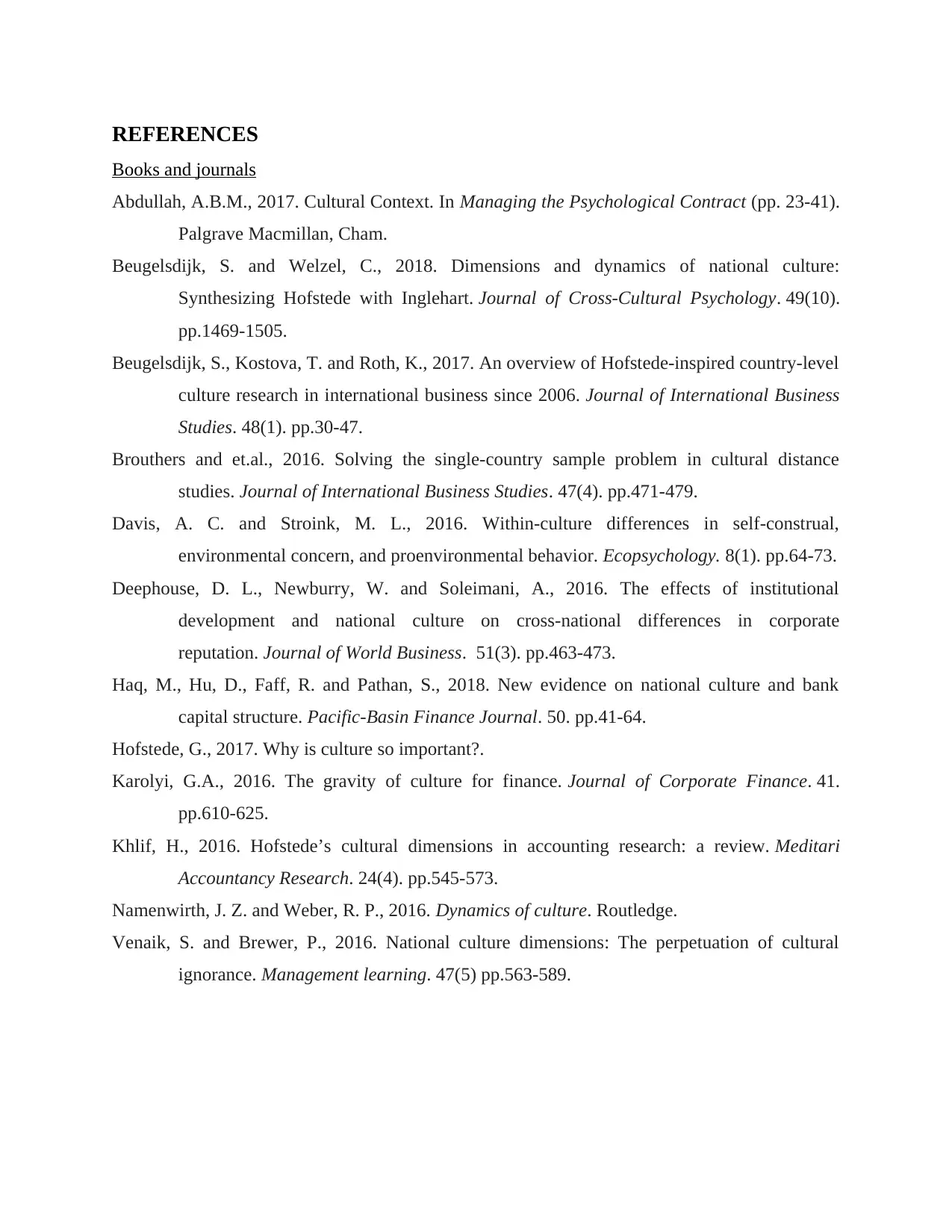
REFERENCES
Books and journals
Abdullah, A.B.M., 2017. Cultural Context. In Managing the Psychological Contract (pp. 23-41).
Palgrave Macmillan, Cham.
Beugelsdijk, S. and Welzel, C., 2018. Dimensions and dynamics of national culture:
Synthesizing Hofstede with Inglehart. Journal of Cross-Cultural Psychology. 49(10).
pp.1469-1505.
Beugelsdijk, S., Kostova, T. and Roth, K., 2017. An overview of Hofstede-inspired country-level
culture research in international business since 2006. Journal of International Business
Studies. 48(1). pp.30-47.
Brouthers and et.al., 2016. Solving the single-country sample problem in cultural distance
studies. Journal of International Business Studies. 47(4). pp.471-479.
Davis, A. C. and Stroink, M. L., 2016. Within-culture differences in self-construal,
environmental concern, and proenvironmental behavior. Ecopsychology. 8(1). pp.64-73.
Deephouse, D. L., Newburry, W. and Soleimani, A., 2016. The effects of institutional
development and national culture on cross-national differences in corporate
reputation. Journal of World Business. 51(3). pp.463-473.
Haq, M., Hu, D., Faff, R. and Pathan, S., 2018. New evidence on national culture and bank
capital structure. Pacific-Basin Finance Journal. 50. pp.41-64.
Hofstede, G., 2017. Why is culture so important?.
Karolyi, G.A., 2016. The gravity of culture for finance. Journal of Corporate Finance. 41.
pp.610-625.
Khlif, H., 2016. Hofstede’s cultural dimensions in accounting research: a review. Meditari
Accountancy Research. 24(4). pp.545-573.
Namenwirth, J. Z. and Weber, R. P., 2016. Dynamics of culture. Routledge.
Venaik, S. and Brewer, P., 2016. National culture dimensions: The perpetuation of cultural
ignorance. Management learning. 47(5) pp.563-589.
Books and journals
Abdullah, A.B.M., 2017. Cultural Context. In Managing the Psychological Contract (pp. 23-41).
Palgrave Macmillan, Cham.
Beugelsdijk, S. and Welzel, C., 2018. Dimensions and dynamics of national culture:
Synthesizing Hofstede with Inglehart. Journal of Cross-Cultural Psychology. 49(10).
pp.1469-1505.
Beugelsdijk, S., Kostova, T. and Roth, K., 2017. An overview of Hofstede-inspired country-level
culture research in international business since 2006. Journal of International Business
Studies. 48(1). pp.30-47.
Brouthers and et.al., 2016. Solving the single-country sample problem in cultural distance
studies. Journal of International Business Studies. 47(4). pp.471-479.
Davis, A. C. and Stroink, M. L., 2016. Within-culture differences in self-construal,
environmental concern, and proenvironmental behavior. Ecopsychology. 8(1). pp.64-73.
Deephouse, D. L., Newburry, W. and Soleimani, A., 2016. The effects of institutional
development and national culture on cross-national differences in corporate
reputation. Journal of World Business. 51(3). pp.463-473.
Haq, M., Hu, D., Faff, R. and Pathan, S., 2018. New evidence on national culture and bank
capital structure. Pacific-Basin Finance Journal. 50. pp.41-64.
Hofstede, G., 2017. Why is culture so important?.
Karolyi, G.A., 2016. The gravity of culture for finance. Journal of Corporate Finance. 41.
pp.610-625.
Khlif, H., 2016. Hofstede’s cultural dimensions in accounting research: a review. Meditari
Accountancy Research. 24(4). pp.545-573.
Namenwirth, J. Z. and Weber, R. P., 2016. Dynamics of culture. Routledge.
Venaik, S. and Brewer, P., 2016. National culture dimensions: The perpetuation of cultural
ignorance. Management learning. 47(5) pp.563-589.
1 out of 10
Related Documents
Your All-in-One AI-Powered Toolkit for Academic Success.
+13062052269
info@desklib.com
Available 24*7 on WhatsApp / Email
![[object Object]](/_next/static/media/star-bottom.7253800d.svg)
Unlock your academic potential
Copyright © 2020–2025 A2Z Services. All Rights Reserved. Developed and managed by ZUCOL.





